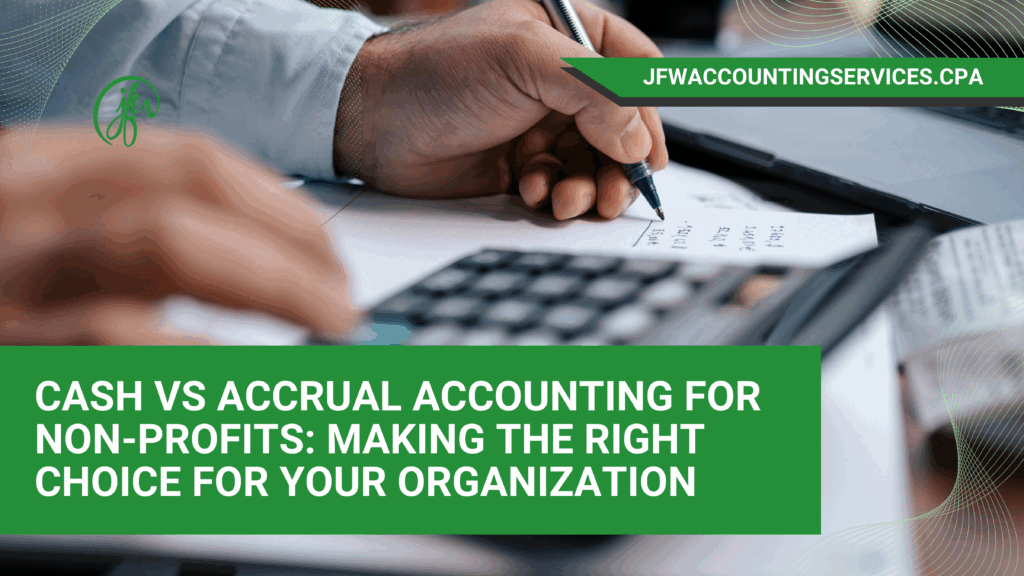Most non-profit leaders know they need a solid accounting system, but many don’t fully grasp how the choice between cash vs accrual accounting for non-profits fundamentally shapes their organization’s future. This decision reaches far beyond bookkeeping—it influences financial reporting clarity, strategic decision-making capacity, and regulatory compliance requirements. Understanding the core differences between these accounting approaches allows you to select a system that not only meets your current operational needs but also supports your long-term mission and growth objectives.
Understanding the Basics
Cash Accounting
Cash accounting is a straightforward method where transactions are recorded when money physically changes hands. With this approach, your organization records revenue when it’s received and expenses when they’re paid. This system tracks the actual flow of cash in and out of your organization.
For example, if a donor pledges $10,000 in December but sends the check in January, a cash-based system would record that donation in January when the money arrives in your account.
Accrual Accounting
Accrual accounting recognizes revenues and expenses as they are earned or incurred, regardless of when the cash is exchanged. This method focuses on your financial commitments—both what supporters owe to you and what you owe to external parties.
Using the same example, if a donor pledges $10,000 in December, an accrual-based system would record that donation in December when the pledge is made, even though the money hasn’t arrived yet.
When Cash Accounting Works Best
Small non-profits often benefit from cash accounting when funding comes primarily from immediate donations and simple grants, providing clear visibility into available funds. This approach works well for organizations with:
- Limited financial resources
- No paid staff or only a small team
- Simple financial transactions
- No complex grant reporting requirements
Cash accounting is less complex and may be the right choice for small non-profits that don’t have experience with accounting, the budget to hire help, or time to learn. It allows for tracking transactions in a spreadsheet if your organization isn’t ready to invest in accounting software.
When Accrual Accounting Is Necessary
As a non-profit organization grows, accrual-basis accounting can provide the structure and accuracy needed to record funding from multiple sources, track expenses in alignment with donors’ intentions, and allocate funds to various programs.
Accrual accounting becomes essential when your organization:
- Manages multiple grants with specific reporting requirements
- Has significant pledged donations
- Applies for major foundation or government funding
- Budgets for multiple programs or departments
- Plans for long-term financial stability
- Requires financial statements for external stakeholders
Most banks, foundations, and large grantmakers will only share their wealth if you provide accrual-based financials.
Regulatory Considerations
It’s important to note that while an organization can choose either method, Generally Accepted Accounting Principles (GAAP) requires the use of accrual basis accounting. This compliance becomes crucial as your organization grows.
Per IRS guidelines, only organizations with less than $26M in gross receipts over a 3-year period are eligible to use cash accounting. If your non-profit is approaching this threshold, planning for a transition to accrual accounting is advisable.
Impact on Financial Reporting
The accounting method you choose directly affects how your financial statements represent your organization’s health:
By recording revenue and expenses when they happen, instead of when cash is exchanged, accrual accounting helps provide a more accurate picture of the organization’s financial health at any given time.
Cash accounting, while simpler, can create misleading financial statements. For instance, if you pay for a major event in one month but receive the revenue in another, cash accounting would show a large loss followed by a large gain, when the reality is more balanced.
Making the Transition
Many non-profits begin with cash accounting and transition to accrual as they grow. This transition requires planning:
- Assess your organization’s current and future needs
- Evaluate your technological capabilities
- Consider staff training requirements
- Develop a realistic timeline for implementation
- Possibly engage professional accounting support
Moving from cash-basis to accrual-basis accounting can help your non-profit better manage its financial health and improve transparency. The transition, while requiring some investment, provides long-term benefits in financial management and stakeholder confidence.
Strategic Decision-Making Benefits
A more accurate understanding of your organization’s financial health means non-profit leaders can make better strategic, data-driven decisions. Accrual accounting provides the data needed to forecast cash flow, budget more effectively, and allocate resources where needed most.
This enhanced visibility allows you to:
- Identify program sustainability
- Recognize financial trends
- Plan for future growth
- Make informed investment decisions
- Respond proactively to financial challenges
Selecting What’s Right for Your Organization
The right accounting method for your non-profit depends on your specific situation, size, complexity, and goals. Consider consulting with a non-profit accounting specialist who can assess your unique needs and guide you toward the most appropriate solution.
Remember: Your choice isn’t permanent. The important thing is picking the method that best serves your mission and stakeholders today while considering your future needs.
Get Expert Guidance
Contact us today to learn how JFW Accounting Services can help transform your financial operations. Our team offers professional guidance on selecting the right accounting method for your non-profit, ensuring compliance, and implementing technology solutions that keep your organization running smoothly while you focus on your mission. With our expertise in non-profit accounting, we’ll help you make informed financial decisions that support your long-term goals and sustainability.
Schedule a consultation today.

Jo-Anne Williams Barnes, is a Certified Public Accountant (CPA) and Chartered Global Management Accountant (CGMA) holding a Master’s of Science in Accounting (MSA) and a Master’s in Business Administration (MBA). Additionally, she holds a Bachelor of Science (BS) in Accounting from the University of Baltimore and is a seasoned accounting professional with several years of experience in the field of managing financial records for non-profits, small, medium, and large businesses. Jo-Anne is a certified Sage Intacct Accounting and Implementation Specialist, a certified QuickBooks ProAdvisor, an AICPA Not-for-Profit Certificate II holder, and Standard for Excellence Licensed Consultant. Additionally, Jo-Anne is a member of American Institute of Certified Public Accountant (AICPA), Maryland Association of Certified Public Accountants (MACPA), and Greater Washington Society of Certified Public Accountants (GWSCPA) where she continues to keep abreast on the latest industry trends and changes.

